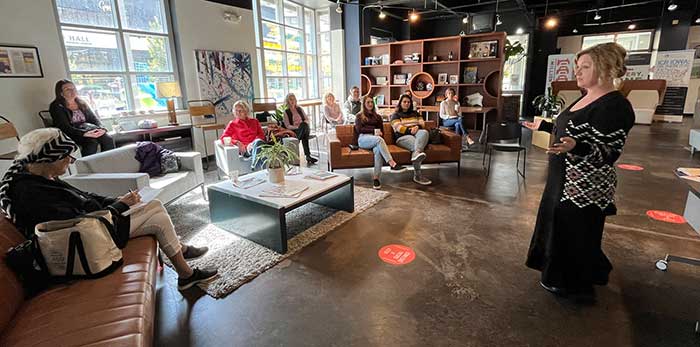
Author Leah Jacobson speaks to a group at MERGE in the Iowa City ped-mall earlier this month.
By Lindsay Steele
The Catholic Messenger
Women have made tremendous progress in their quest for American society to view them as equals to men. However, the feminist movement took a negative turn in the mid-1900s, Leah Jacobson, author of “Wholistic Feminism,” believes.
Repressive laws and social norms no longer stood in the way of women reaching their potential, but fertility became the enemy. The value of women became intertwined with maximum productivity in the workplace, and children were seen as barriers to that.
With the availability of birth control and the legalization of abortion, workplaces and society in general expected women to suppress their fertility if they wanted to get ahead. “This changed how women viewed themselves for generations,” Jacobson told a group of men and women assembled at MERGE in the Iowa City ped-mall.
Jacobson hopes to counter this expectation, especially in light of growing levels of depression in women in recent years. “You and your body were never the problem,” she said, advocating for an integrative approach that accommodates and honors a woman’s vocation to family life.
The Minnesota-based lactation consultant and mother of seven living children founded the Guiding Star Project in 2011, a nationwide family of care centers that empower women to understand, embrace and love their natural bodies. She published “Wholistic Feminism” in June 2021 to address what she calls an “identity crisis” caused by the women’s movement.
Jacobson was the keynote speaker of the 2022 Culture of Life Dinner at St. Mary Parish in Solon Oct. 15 and discussed the themes of her book at MERGE Oct. 16. St. Mary-Solon Culture of Life team sponsored both events.
In general, workplaces and government policies are not family-friendly and do not work to accommodate the needs of working mothers. “There was a point where we could have said, ‘We can make the workplace accommodate women,’ but we went right to the sexual revolution and that was seen as the solution,” she said.
Jacobson identified Patagonia clothing company as a positive example of a family-friendly workplace. She doesn’t agree with the company on all issues but appreciates its on-site childcare for employees, its maternity leave policy and its business trip incentive. Parents may stop by to see their children while at work; women receive 16 weeks of paid maternity leave while men get 12 weeks; and the company covers the cost of a caretaker to accompany parents on business trips. Patagonia has “incredible employee retention.” Some of the former daycare participants now work as employees.
Jacobson wonders whether fewer people would get an abortion if they felt more supported in the workplace. Since the overturn of Roe v. Wade this summer, more companies are offering to pay travel expenses for employees who have out-of-state abortions. “Why are corporations only funding that choice (abortion)? What do the women involved actually want?”
Natalee Hart, a Catholic University of Iowa student, participated in the event with a friend. Both saw the event as an opportunity to listen and learn from others. “I wanted to learn more about what feminism means and think about how feminism has been shaped throughout history. It’s very interesting,” Hart said.
JoEllen Ritchie, a member of St. Mary Parish-Solon’s Culture of Life Committee, read “Wholistic Feminism” prior to the presentation and appreciated the opportunity to listen to the author and share in discussion with adults of all ages.
Jacobson encouraged her audience to advocate for equality in a way that affirms and celebrates fertility. That begins with a willingness to talk with people they might not normally talk to and who they might not agree with on all issues. “That’s the only way this is going to change.”











